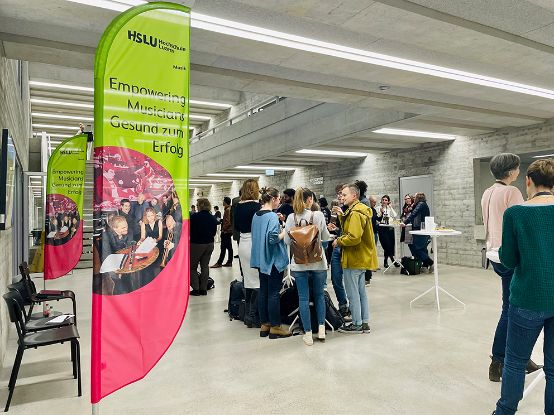Top performance without overloading
The Lucerne School of Music has been conducting research into the well-being of musicians for several years. The international symposium on November 24th and 25th showed perspectives.

"No pain, no gain." The motto is said to go back to Jane Fonda's aerobics videos from the 1980s. It also describes an attitude in 20th century music education: excellence can only be achieved by practising beyond the pain threshold. Important pedagogical schools even followed the principle that only those who were first broken emotionally could be developed into perfect virtuosity. In sport and dance, this mentality has largely been abandoned - or is in the process of being abandoned, as the recent scandals in Swiss gymnastics and dance training show.
This change of heart is also increasingly evident in music education. At the end of the 1990s, Horst Hildebrandt and Marina Sommacal set up music physiology courses at the Winterthur-Zurich University of Music and the Basel University of Music. In 2005/2006, this led to the founding of the Swiss University Center for Music Physiology as a cooperation project between all Swiss music academies. In addition, trombonist Pia Bucher initiated the Swiss Society for Music Medicine in 1997 as a contact and advice center.
Straightforward and interdisciplinary approaches
In 2019, the Competence Center for Music Performance Research at the Lucerne University of Applied Sciences and Arts which aims to "make a sustainable contribution to promoting health and well-being" in music-making with specific projects and development measures. Part of the project was the symposium "Empowering Musicians: Healthy to Success" organized by music psychologist Elena Alessandri and her team. It broadened the horizon even further than usual: the program included presentations with online connections from New York, London, South Africa and - not that far away geographically, but at least as remarkable in terms of Swiss higher education policy - from Ticino (the Scuola universitaria professionale della Svizzera italiana).
There was a refreshing approach to the topic, for example in the online lecture by Noa Kageyama, who teaches violin and performance psychology at the Juilliard School. He demonstrated how musicians can benefit from the findings of sports psychology - in an unusually relaxed and unpretentious manner for us Central Europeans. Without any fear of commercialization, Kageyama also does this as a business model with offers available on a website called "Bulletproofmusician" can be called up. He made it clear that learning a skill and performing it are not the same thing and require different practice strategies.
Valentin Gloor, the director of the host institution, explained in his welcoming address that the Lucerne University of Applied Sciences and Arts has made the topic of health a cross-departmental focus. This interdisciplinary and cross-domain thinking is reflected in the research activities of the Competence Center Music Performance Research, which also includes studies on music therapy treatments. For example, a consultation study is dedicated to the use of music by Parkinson's patients in Switzerland and poses the question of how those affected can use music to improve their quality of life. (Ed. see article by Dawn Rose, SMZ 4/2022, p. 4 or English version musikzeitung.ch/memory)
Prevention at music school
The symposium made it clear that the zeitgeist in pedagogy and in everyday musical life is changing. Instead of taking overloads as a sign that one is ready for peak performance, methods are now being developed to prevent acute and chronic damage from occurring in the first place. Instead of a repair shop that those seeking help perceive as an asylum of last resort, musicians' medicine is increasingly becoming a place of physical and mental well-being based on partnership.
Oliver Margulies, research associate at the music physiology and music medicine consultation at the Zurich University of the Artspresented an initiative designed to bring this preventative approach to music schools. A corresponding certificate should ensure that the management team of a music school is "aware of possible psycho-physical stress and health problems caused by making music", is committed to prevention and health promotion and offers music physiology training events at regular intervals.
The wish list for music education institutions also includes physical training, relaxation techniques and mental training as part of the musical training of additionally qualified music teachers and regular stage training with a selectable level of challenge in a protected environment. The "practical transfer of research findings on training theory, break concepts, muscle, breathing and hearing physiology, regeneration options, acoustics and instrument making into everyday teaching" are also listed there.








